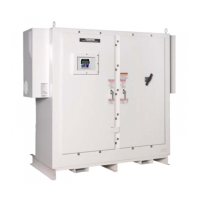68 HX7+ ASD Quick Start Guide
Viewing Trip Information
In the event that the condition causing an Alarm does not return to the normal operating level within a
specified time, the ASD Faults and a Trip is incurred.
When a trip occurs, the resultant error information may be viewed either from the Trip History screen
(Program Monitor Setup Trip History), the Trip Monitor from ASD screen (Program Monitor
Setup Trip Monitor From ASD), or from the Monitor screen.
Trip History
The Trip History screen records the system parameters for up to 101 trips (RTC option required). The
recorded trips are numbered from zero to 100. Once the Trip History record reaches trip number 100, the
oldest recorded trip will be deleted with each new record stored (first-in first-out). The Trip # field may be
selected and scrolled through to view the recorded trip information for a given trip number. The monitored
parameters are listed in Table 16 as At-trip Recorded Parameters (parameter readings at the time that
the trip occurred).
Table 16. Trip History Record Parameters (RTC option required).
At-trip Recorded Parameters
Trip records that are assigned zero and one are comprised of the full list of monitored parameters (32).
Trip records 2 – 18 are comprised of parameters 1 – 16. Trip records 19 – 100 are comprised of
parameters 1 – 7.
1) Trip Number 9) Bus Voltage 17) Torque Reference 25) ASD Load
2) Trip Type 10) Discrete Input Status 18) Torque Current 26) DBR Load
3) Time and Date 11) OUT1/OUT2/FL Status 19) Excitation Current 27) Input Power
4) Frequency at Trip 12) Timer 20) PID Value 28) Output Power
5) Output Current 13) Post Compensation Frequency 21) Motor Overload 29) Peak Current
6) Output Voltage 14) Feedback (inst.) 22) ASD Overload 30) Peak Voltage
7) Direction 15) Feedback (1 sec.) 23) DBR Overload 31) PG Speed
8) Frequency Reference 16) Torque 24) Motor Load 32) PG Position

